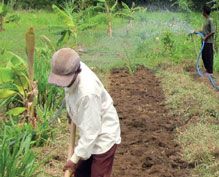Sri Lankan Organic Products

Organic agriculture is a sustainable form of agriculture, for both ecological and economic reasons. The development trend of Organic Agriculture in world during the past decade shows a positive growth. As an example USA and Canada are having rapidly growingOrganic Food market of 20% and Europe is having 7.8% per year.
Sri Lanka, after its pioneering move in introducing organically certified tea to the world market, expanded this product range to non-traditional agricultural products such as:
- Spices
- Essential oils
- Herbs
- Herbal preparations
- Desiccated coconut and other coconut-based products
- Oil seeds
- Pulses
- Cashew
- Rubber
- Tropical fruit
- Vegetables
One of the salient features of the majority of such non-traditional organic produce is the fact that they are being produced by small scale farmers in the provinces. There is substantial potential for the growth of this sector.
An organic label indicates to the consumers that the product has been produced using certain production methods. The International Federation of Organic Agriculture Movements(IFOAM) provides guidelines that have been widely adopted by countries for organic production and processing.
Organic agriculture provides a holistic approach to management systems that promotes agronomic, biological and mechanical methods as opposed to using synthetic materials for crop production and processing. Producers and manufacturers are allowed to make declarations in the market place based on standards and established procedures.
These systems facilitate market access, comparability and competition on equal terms. The use of accredited laboratories, inspection and certification bodies and mechanisms for verification of the authenticity of certifications and reports by regulatory bodies helps build trust and confidence among the trading partners.
The Sri Lanka Accreditation Board (SLAB) with internationally recognized mutual reorganization arrangements could provide the required assurance to facilitate international trade. Private inspectional certification bodies that had been accredited by international agencies preformed this function to facilitate international trade.

No comments:
Post a Comment